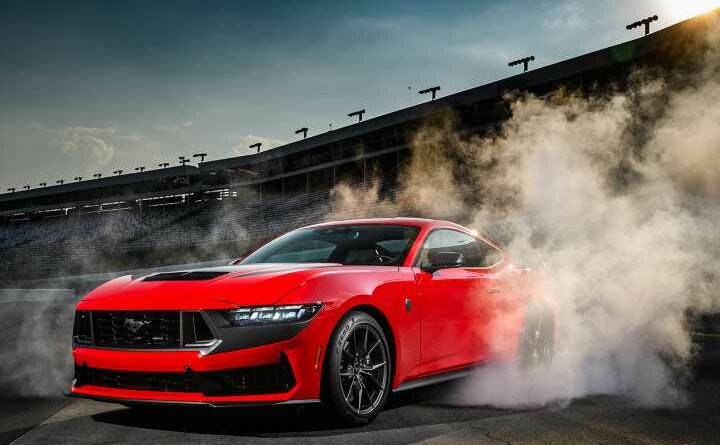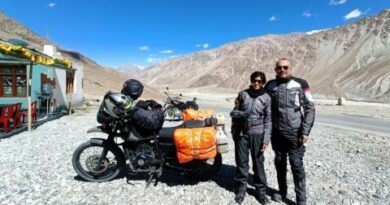2024 Ford Mustang Dark Horse | PH Review
The final generation of the original Pony Car promises to be a highlight
By Mike Duff / Tuesday, 10 October 2023 / Loading comments
Like frogs being gradually boiled we often don’t notice how radically the world is changing around us. So here’s a cause to pause for thought: the Ford Mustang now offers the last chance to buy a new car combining both a V8 engine and a manual gearbox on this side of the Atlantic. Even in America, where eight-cylinder engines aren’t near extinction and keener drivers prefer clutch pedals, the retirement of the Chevrolet Camaro means the only alternative that still combines both is the Cadillac CT5-V Blackwing.
In the U.S. buyers will even be able to choose between two different V8 manual Mustangs with the launch of the car you see here, the Dark Horse. Both versions will ultimately be coming to the UK, but PH has already got the chance to drive the Dark Horse in its homeland.
Behind the new name lies a familiar concept – a firmer, faster and dynamically turned-up version of the regular car, similar in principle to the last-gen Mustang Mach 1. The Dark Horse’s 32-valve 5.0-litre ‘Coyote’ engine gets upgraded with the stronger conrods from the old GT500 and tweaked software, pushing output to 500hp in the U.S. Sadly, as with the Ranger Raptor, stricter emissions regulations will trim the output of the forthcoming Euro version to a more modest 449hp. There are ticks next to plenty of other go-faster boxes, too. The Dark Horse gets firmed-up suspension with stiffer springs and thicker anti-roll bars as well as standard fitment of active dampers plus uprated brakes. American buyers also get to specify the Handling Pack. which brings more aggressive suspension geometry, 19-inch wheels and a switch to Pirelli P-Zero Trofeo RS tyres, the new suffix indicating that these combine track adhesion with road friendly wear ratings. Sadly the Handling Pack won’t be offered in the UK, as it puts the edges of the tyres too close to the bodywork.
Which makes it critically awkward that I only got to drive two cars fitted with the Handling Pack in the U.S, experiencing them separately on road and track. Both cars also had the standard six-speed manual gearbox in place of the optional 10-speed automatic – but it does mean that we’ll have to wait until the regular Dark Horse gets here to find out how it feels on standard Pirelli P Zeroes.
Despite Ford’s claims of newness, the seventh-gen Mustang is essentially a heavy facelift of the last one. Despite the familiar form there have been significant changes to bodywork, with the loss of the sixth-gen’s scallop-shaped side indentations making the new car look plumper and sleeker in profile, with new dark patches on the front bumper making lighter colours look like they have extended radiators. Inside, there’s an all-new dashboard and an obvious tech upgrade with the presence of twin standard displays, one replacing the analogue instruments, with the XL central touchscreen next to it now located on the top of the dashboard.
Compared to the regular V8 GT, the Dark Horse is distinguished inside by a black Mustang emblems on both radiator and steering wheel, plus more aggressive wingwork. Inside the driver gets Alcantara pads on the steering wheel, and the manual car also gets a spherical metal gear shifter that both looks and feels better than the GT’s chunkier leather-wrapped version. This is more than just a stylistic difference, with the Dark Horse getting a Tremec gearbox with shorter ratios reckoned to be better suited to track work than the GT’s Getrag manual.
To no surprise, the Dark Horse sounds great. It comes with several switchable exhaust modes, but even the stealthiest Quiet mode is still rich in V8 fruitiness, and the loudest Track setting brings up a dashboard warning it is not intended for road use. Power delivery is correspondingly no-nonsense: throttle response is crisp, low down torque is keen and the mid-range is strong enough to mean that trips to the upper reaches of the rev counter are unlikely to be more than an occasional treat on road. Even using the beautifully weighted shift action to change up well short of the marked 7,500rpm redline, the Dark Horse feels (and sounds) impressively potent.
Yet on road there is still a slight laziness to the Dark Horse’s reactions, a discernible pause as it firstly responds to steering input and then settles its weight when turning into a corner. In this it feels closer to the GT than it does to the last-generation Mustang GT350.
Of course, much of this is down to the laws of motion and the Mustang’s chunky mass. While 1,770kg on Ford’s numbers might not seem especially chunky in this bloated age, it means the Dark Horse is nearly 300kg heavier than a 992-generation 911 Carrera. But the laid-back sensation is doubtless deliberate, too. Ride is firm, sometimes uncomfortably so over undulating roads, but body control is excellent thanks to the no-nonsense dampers. But none of the switchable dynamic modes make the Dark Horse feel small or light.
The hugeness of the grip from the Trofeo RS rubber brought by the Handling Pack was the other defining characteristic on road. This doesn’t kill the dynamic experience as it does on some over-tyred cars; there is plenty of sense of front-end connection through the steering wheel. But the Handling Pack does mean that the ultimate limits are so high as to be pretty much unreachable on public roads. The chance to drive the standard GT on regular P-Zeros back-to-back proved that the lesser car was much more willing to move around at road speeds.
I also got to drive another Handling Pack equipped Dark Horse on track a couple of weeks later (although at the Thunderhill Raceway in California, not the Charlotte Motor Speedway you see in the pictures here.) The Mustang coped with the challenge amazingly well for something so big and heavy, the Trofeos coming up to temperature quickly and happy to take long stints of big loadings without complaint, the brakes similarly tireless when asked to deal with big thermal loads. The bellowing engine remains the defining highlight, with the racetrack proving it is more than capable of delivering edgier thrills in the bits where the huge grip of the tyres could be reached and breached. There can be few more progressive cars when pushed into oversteer.
Perhaps fittingly for a car that is approaching the end of its life, this generation being almost certainly the last combustion Mustang, the Dark Horse feels like a Greatest Hits compilation. Like the best of its predecessors it has been built to deliver visceral thrills over ultimate handling finesse, its priorities obvious in functions like the ability to line lock the front wheels for a tyre-warming burnout, and the juvenile joy of an electronic handbrake which operates like a mechanical one and is intended to help tip the rear of the car into a drift.
The Dark Horse is a noisy, joyful celebration of the muscle car and everything that we’re going to miss about it when – all too soon – it finally disappears. For that we should love it.
SPECIFICATION | FORD MUSTANG DARK HORSE
Engine: 5,038cc V8
Transmission: Six-speed manual, rear-wheel drive
Power (hp): 500@7,250rpm
Torque (lb ft): 418@4,900rpm
0-60mph: 4.4 seconds
Top speed: 166mph
Weight: 1,770kg
MPG: TBC (probably not great)
CO2: TBC (also probably not great)
Price: $60,865 (U.S., including Destination and Gas Guzzler tax)
Source: Read Full Article


